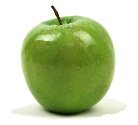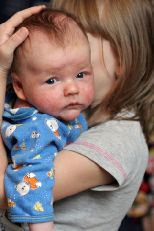



Helping you make healthy choices for you and your family

Eczema, also known as dermatitis, affects around one in five children, yet back in the 1950’s, less than 5% of children in the UK had this unpleasant skin condition.
So what has caused this huge rise in eczema? Researchers believe there are a number of factors involved. By identifying the triggers, many sufferers have been able to find relief from their symptoms and are able to manage their condition successfully.
So what has caused this huge rise in eczema? Researchers believe there are a number of factors involved. By identifying the triggers, many sufferers have been able to find relief from their symptoms and are able to manage their condition successfully.
What is Eczema?
Eczema is a group of non-contagious skin conditions which can affect all age groups but most commonly young children. The symptoms can range from dry skin with red, itchy patches in its mild form to large areas of the body covered in inflamed, raw skin which bleeds or weeps and may lead to infection. However, 60 - 70% of children are virtually clear of symptoms by the time they reach their mid-teens.
Childhood Eczema

The most common forms of eczema are:
1) Atopic eczema which is closely linked with asthma and hayfever and thought to be hereditary. This type can be extremely itchy with overall dryness and inflammation of the skin. It can appear in young babies and can regularly flare up and down. Constant scratching may cause the skin to crack and weep, often leading to infected sores, requiring antibiotic treatments.
2) Allergic contact dermatitis, usually caused by exposure to a substance over a period of time. The immune system suddenly develops an allergic reaction to that substance, causing an itchy, red rash. Common allergens are nickel in jewellery or latex in rubber gloves.
3) Irritant contact dermatitis – often occurs on the hands and is a reaction to irritating substances eg detergents or chemicals. Symptoms are similar to allergic contact dermatitis.
Helpful Suggestions
As there are a variety of triggers, successful management of this skin condition will vary with each sufferer.
Prevention - If you or your partner have or had eczema, asthma or hayfever, there is a possibility that your children will inherit one of these conditions. Studies have shown that babies of mothers who took probiotics during pregnancy were 40% less likely to suffer from eczema and those taking essential fatty acids (omega 3 and 6) during pregnancy and whilst breast feeding may also help. Introducing solids to your baby after 6 months may further reduce the risk.
Diet - only around 10% of children with eczema will find food as their main or only trigger and in around 30%, certain foods may play a part. Keeping a food diary may help to pinpoint problem foods or for children over 2 years, a food intolerance test may be useful. Where possible, choose organic foods to avoid any pesticide residues, and also processed foods containing artificial additives as these may trigger a flare-up. It is advisable to only attempt an exclusion diet of main food groups such as dairy or grains under the supervision of a qualified practitioner.
Water - eczema may be aggravated by hard water, and sufferers who install a water softener often experience immediate relief. Hard water contains calcium and magnesium salts which are thought to cause dryness and irritation. On top of this, more soaps and detergents are needed to make a lather which in themselves can dry out and irritate the skin.
Skin Care Products - toiletries containing chemicals such as Sodium Lauryl/Laureth Sulphate, Propylene Glycol or fragrance may cause a skin reaction as well as some laundry detergents and fabric softeners so it is best to seek milder alternatives from specialist companies.
Disclaimer: The information in this article should not be regarded as medical advice. If you are receiving medical treatment or taking prescribed medication, you are advised to consult your GP or health practitioner before making any changes to your diet or lifestyle.
| Your Health Your Future |
| Controversial Ingredients |
| Nutritional State |
| Parent and Child |
| Microwave Ovens |
| Recommended Books |
| Skin Absorption |
| Sodium Lauryl Sulphate |
| Propylene Glycol |
| DEA, MEA, TEA |
| Chemical Calculator |
| Fluoride |
| Aspartame |
| Fluoridation |
| Water Filtration |
| Planning a Pregnancy |
| Pregnancy Care |
| Post Pregnancy Care |
| Amazon Books |
| EBooks |
| About Us |
| Health Services |
